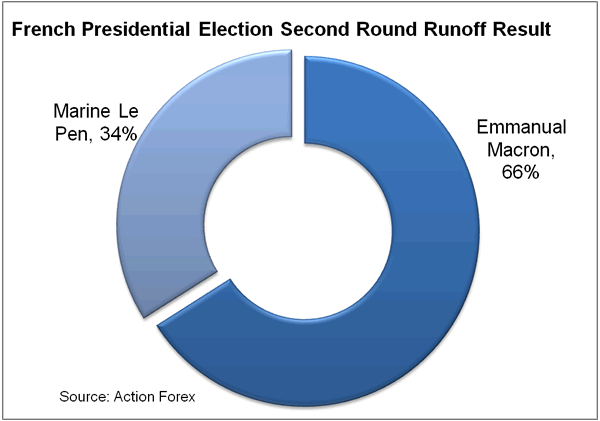Centrist independent Emmanuel Macron has won the French presidential election in a decisive victory. With virtually all votes counted, Macron has taken 66% of votes in the second round runoff, compared with far-right populist Marine Le Pen’s 34%. While the election outcome had been suggested in the pre-election opinion polls, financial markets still reacted positively as defeat of Le Pen signaled a diminished risk of Frexit, a real concern haunting politicians and investors across the globe after the surprising Brexit referendum and Donald Trump’s victory in US presidency.
Abstentions and spoiled votes larger than Le Pen’s total
Despite Le Pen’s loss, it is the highest number of votes that far-right parties have ever received in modern French history. As she noted in the concession speech, she was ‘designated the leading opposition force in this second round’. Turnout of this election was 65.4%, 6.6 percentage points lower than that in the 2012 runoff and the lowest since the second round of the 1981 election. The total number of abstentions and spoiled votes, at 12 million, was greater than 10.7 million received by Le Pen, underpinning the general public’s discontent over the current political and economic environment in France.

.
Macron to work on changing EU and modernizing economy
Unlike Le Pen, Macron is pro-EU but believes some changes are needed to make the institution strong. As he suggested in an interview prior to the election, ‘I propose to restore the credibility of France in the eyes of Germany, to convince Berlin in the next six months to adopt an active investment policy and move towards greater solidarity in Europe’. Regarding immigration, Macron proposed to strengthen the EU’s external borders and push for additional resources at the European Border. He added that ‘security would ‘not be better served by closing national borders’.
On the economy and the labor market, Macron’s plan in modernization of the economy includes an investment program focusing on the digital economy and environmental protection. Transformations of the health care system and housing policies are also in his agenda. The government will launch labour-market reform in the coming weeks, aiming at simplification of the labour code, and reform of unemployment insurance and vocational training. The key any rhetoric is execution, though.
.
Parliamentary election next
The next event in France is the Parliamentary election scheduled in June. Only with a parliamentary majority would the new President be able to fully implement his political agenda and designate his own PM and cabinet members. The first poll for the upcoming election, released last week, signaled Macron’s En Marche! Movement is on track to win 249 to 286 seats. Centrist and conservative parties would win around 200-210 seats, the far-right National Front would win 15 to 25 seats while the Socialist left 28 to 43 seats.
